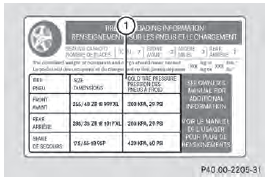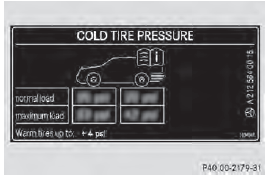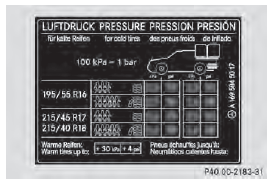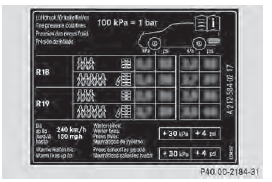Tire pressure specifications
Important safety notes
WARNING
Underinflated or overinflated tires pose the
following risks:
Х the tires may burst, especially as the load
and vehicle speed increase.
Х the tires may wear excessively and/or unevenly, which may greatly impair tire traction.
Х the driving characteristics, as well as steering and braking, may be greatly impaired.
There is a risk of an accident.
Follow recommended tire inflation pressures and check the pressure of all the tires including the spare wheel: Х monthly, at least Х if the load changes Х before beginning a long journey Х under different operating conditions, e.g.
off-road driving
If necessary, correct the tire pressure.
The specifications on the sample Tire and Loading Information placard and tire pressure tables are examples. Tire pressure specifications are vehicle-specific and may deviate from the data shown here.
The tire pressure specifications that are valid for your vehicle can be found on the Tire and Loading Information placard and tire pressure table on the vehicle.
General notes
The recommended tire pressures for the tires mounted at the factory can be found on the labels described here.
Operation with the emergency spare wheel .
Operation with a trailer:
the applicable value for the rear tires is the maximum tire pressure value stated in the table inside the fuel filler flap.
Further information on tire pressures can be obtained at a qualified specialist workshop.
Tire and Loading Information placard

1 Recommended tire pressures
The Tire and Loading Information placard is on the B-pillar on the driver's side .
The Tire and Loading Information placard contains the recommended tire pressures for cold tires. The recommended tire pressures are valid for the maximum permissible load and up to the maximum permissible vehicle speed.
Tire pressure table
The tire pressure table is on the inside of the fuel filler flap.

Example: tire pressure table for all tires permitted for this vehicle by the factory
The tire pressure table contains the recommended pressures for cold tires for various operating conditions, i.e. differing load and speed conditions.

Example: tire pressure table with tire dimensions
If a tire size precedes a tire pressure, the tire pressure information following is only valid for that tire size. The load conditions "partially laden" and "fully laden" are defined in the table for different numbers of occupants and amounts of luggage. The actual number of seats may differ.

Some tire pressure tables show only the rim diameters instead of the full tire size, e.g.
R18. The rim diameter is part of the tire size and can be found on the tire sidewall .
If the tire pressures have been set to the
lower values for lighter loads and/or lower
road speeds, the pressures should be reset
to the higher values:
Х if you want to drive with an increased load
and/or
Х if you want to drive at higher road speeds
The tire pressures for increased loads and/or higher road speeds, shown in the tire pressure table, may have a negative effect on driving comfort.
If the tire pressure is not set correctly, this can lead to an excessive build up of heat and a sudden loss of pressure.
For more information, contact a qualified specialist workshop.
See also:
Traction
WARNING
The traction grade assigned to this tire is
based on straight-ahead braking traction
tests, and does not include acceleration,
cornering, hydroplaning, or peak traction
characteristics.
...
Operating safety
Safety notes
WARNING
Work improperly carried out on electronic
components and associated software could
cause them to cease functioning. Because the
vehicle's electronic components are
intercon ...
Safety systems
...
